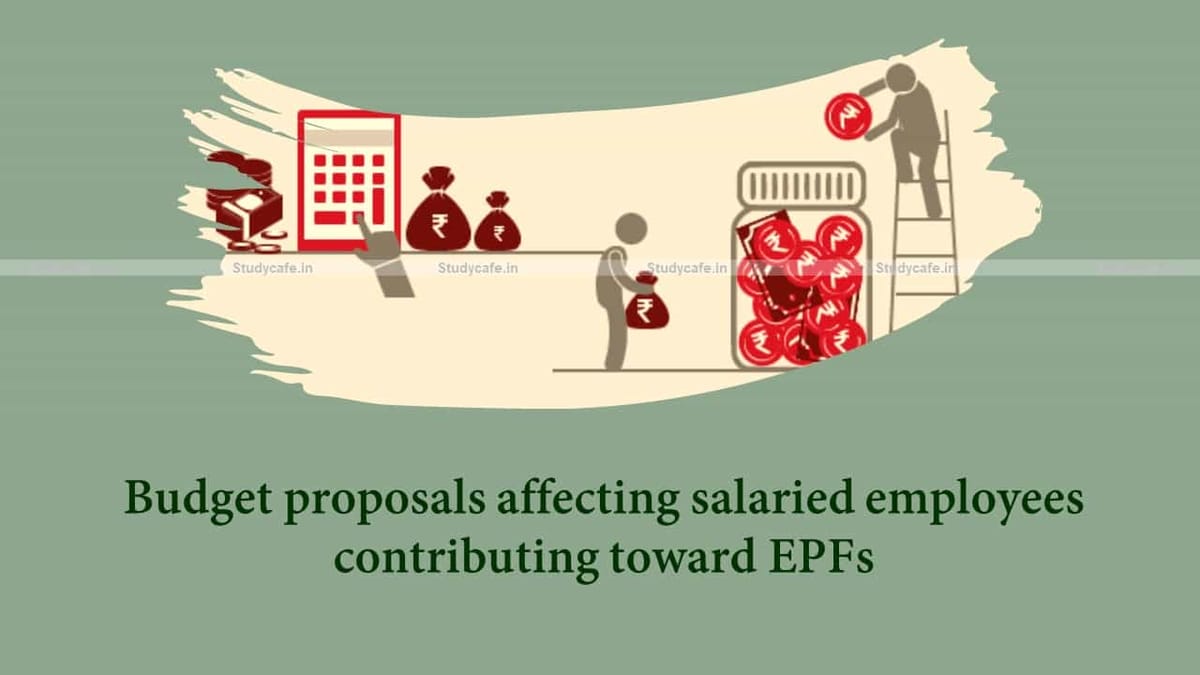CA Balwant Jain | Feb 2, 2021 |

Budget proposals affecting salaried employees contributing toward Employee Provident Funds
Balwant Jain
The finance minister has proposed to partially tax the interest accrued on the provident fund account of employees. Let us discuss the provision.
Present Provisions
Presently, any payment received by an employee from his provident fund account is fully tax free. The same may be received either as partial withdrawal as permitted under the scheme or one received after retirement. The payment received from the provident fund comprises of contribution made by the employer and the employee as well as the interest accrued on the contributions.
Last year, the government amended the tax laws to put a cap on the maximum amount of contribution made by an employer towards provident fund, National Pension Scheme and superannuation scheme to Rs. 7.50 lakhs beyond which the same is taxed as perquisite in the hands of the employee. Moreover, the amendment provided that any interest attributable towards the excess contribution beyond Rs. 7.50 lakhs was also to be treated as perquisite in the hands of the employee.
An employee is required to contribute 12% of his basic salary and dearness allowance towards employee provident fund account which is required to be matched by the employer by equal contribution. There is no such restriction on the employee contributing beyond 12% as voluntary contribution. Since the interest rates have comes down drastically and the rate of interest declared by the government is very attractive and which also comes tax free in the hands of employees, employees are opting for higher voluntary contribution. Since this is in contrast to taxation of maturity proceeds of NPS of which only 60% comes tax free and the balance is indirectly taxed in the form of annuity as the subscriber has to buy annuity of minimum of 40% of the corpus. So there was demand for bringing in parity of taxation between these two retirement products which government tried to do in the past but with no success.
What is the proposal and what are its implications?
Since the interest on contribution made by an employee enjoys tax exemption without there being any upper limit, the government has proposed that interest accrued in respect of employee’s contribution in excess of Rs. 2.50 lakhs every year shall become taxable in the hands of the employee. So the interest in respect of annual contribution of Rs. 2.50 lakhs only will come tax-free and any interest accrued on excess contribution shall become taxable in the hands of the employee year after year.
It is not that the calculation of interest on excess contribution has to be done once only but it has to be made every year for excess contribution made for each of the past years. In my opinion, to expect the employee to make such calculation year after year is too much. If the government does not want the employees to earn tax free interest for contribution beyond Rs. 2.50 lakhs, it should put a cap on maximum contribution every year toward provident fund like one which is applicable in case of Public Provident Fund (PPF) account. This is in contradiction to the proposals contained in the new labour code where the employer and employee will have to make contribution toward provident fund on higher amount as the definition of the salary is proposed to be changed in the new labour code.
In my opinion, since we do not have social security system in our country why should the government discourage anyone from contributing higher amount towards his retirement fund. The government should rethink on this proposal.
There is one more proposal which will directly affect the employees who have provident fund account. Since the employee gets the interest from the date when the employer deposits the money with provident fund authorities, the employees used to suffer for no fault of their. This budget provides that in case the employer fails to deposit the provident fund money by the due date, he will not be allowed the deduction for such contribution which in turn force the employers to pay the contribution by the due date and thus help the employee earn interest for legitimate period.
The writer is a tax and investment expert and can be reached on [email protected]
In case of any Doubt regarding Membership you can mail us at [email protected]
Join Studycafe's WhatsApp Group or Telegram Channel for Latest Updates on Government Job, Sarkari Naukri, Private Jobs, Income Tax, GST, Companies Act, Judgements and CA, CS, ICWA, and MUCH MORE!"